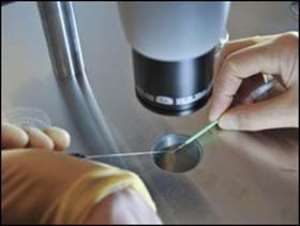
The UK's fertility watchdog has called for a fresh debate on reversing the ban on paying egg and sperm donors.
Head of the Human Fertilisation and Embryology Authority, Professor Lisa Jardine, says proper payment may persuade more donors to come forward.
More and more British couples are going abroad for infertility treatment since the ban on payments was introduced.
The number of women using donated eggs and sperm fell by 25% and 30% respectively between 2004 and 2006.
'Patient welfare'
Professor Jardine told the Times she felt a "responsibility" to look at the ban on selling donated eggs and sperm again.
She said payments may ease the shortage of stocks and keep more patients in Britain to be treated in regulated clinics.
She said: "I'm not saying the decision arrived at before I became chair wasn't the right one at the time.
"But given the evidence that egg shortage is driving women overseas, I feel a responsibility to look at it again."
Professor Jardine added: "My agenda is to try and keep assisted reproduction within our regulated area, not because I'm bossy, but out of concern for patient welfare."
She also said egg donors should be paid more than sperm donors to reflect the greater physical risks involved.
Anonymity for sperm and egg donors was removed in 2005 - another factor thought to be behind the donor shortage.
The maximum any donor can receive in expenses is currently £250.
Professor Jardine told the BBC a payment comparable to the cost of a cycle of IVF treatment - around £3,000 - might be more appropriate for women who donate eggs.
Rewarding altruism
Professor Jardine also wants a wider debate on the question of when family members should be allowed to donate to one another.
Intergenerational donations have occurred, such as the case of a 72-year-old Briton who provided sperm to his daughter-in-law.
Another issue is donation between siblings. Although it is generally accepted that sisters can give eggs to one another, Professor Jardine wants to consider whether a brother should be allowed to donate sperm to his sister if she is using a donated egg.
Commenting on the payment concern, Dr Ainsley Newson, a senior lecturer in biomedical ethics at Bristol University, said the issue was around "reasonable compensation" for the burden of egg retrieval rather than paying for the eggs.
"Increasing the capped amount that women are given for donating eggs may increase donation.
"It will also help to emphasise the altruism behind donation, not forgetting the importance of the gift being made."
Dr Allan Pacey, secretary of the British Fertility Society and a senior lecturer at the University of Sheffield, said: "It's good that we are having a debate about it.
"Most people in the profession would agree that donors should be paid more because it is a big commitment, particularly egg donation."
He said the difficulty was deciding the appropriate sum and how to square this with the "free" altruistic act of donation.
BFS chairman Tony Rutherford said there would have to be a limit set on how many eggs a woman could safely donate.
Laura Witjens, chair of the National Gamete Donation Trust, said: "Egg and sperm donors are doing a fantastic thing for people they don't know with repercussions for themselves and their families for many years to come.
"To fob them off with receipted expenses and a capped £250 payment is an insult to the time, effort, risk and long term implications donors take." Source: BBC




 We’ll no longer tolerate your empty, unwarranted attacks – TUC blasts Prof Adei
We’ll no longer tolerate your empty, unwarranted attacks – TUC blasts Prof Adei
 Bawumia donates GHc200,000 to support Madina fire victims
Bawumia donates GHc200,000 to support Madina fire victims
 IMF to disburse US$360million third tranche to Ghana without creditors MoU
IMF to disburse US$360million third tranche to Ghana without creditors MoU
 Truck owner share insights into train collision incident
Truck owner share insights into train collision incident
 Paramount chief of Bassare Traditional Area passes on
Paramount chief of Bassare Traditional Area passes on
 Two teachers in court over alleged illegal possession of BECE papers
Two teachers in court over alleged illegal possession of BECE papers
 Sunyani: Victim allegedly shot by traditional warriors appeals for justice
Sunyani: Victim allegedly shot by traditional warriors appeals for justice
 Mahama vows to scrap teacher licensure exams, review Free SHS policy
Mahama vows to scrap teacher licensure exams, review Free SHS policy
 Government will replace burnt Madina shops with a new three-story, 120-store fac...
Government will replace burnt Madina shops with a new three-story, 120-store fac...
